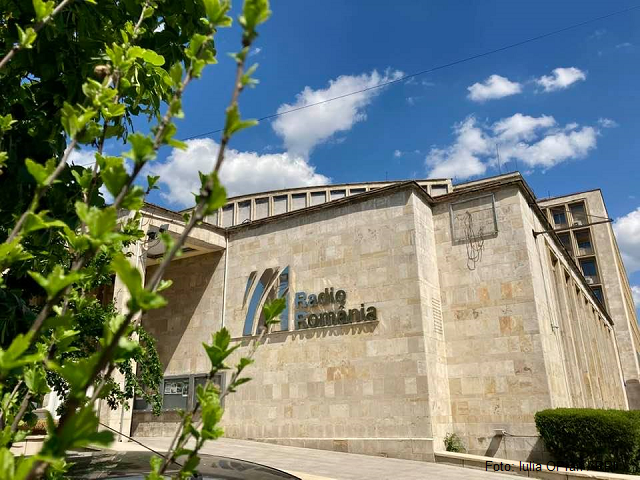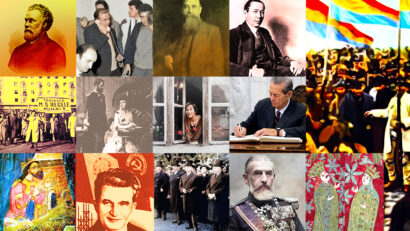Romanian public radio celebrates 93rd anniversary
Radio Day celebrates birthday of Romanian public service radio broadcasting in 1928.

Steliu Lambru, 01.11.2021, 14:00
Romanian public service radio
began its uninterrupted broadcasting on 1st November 1928. Seen as
the most efficient means of disseminating information, the then brand-new
medium of communication via radio soon grew to become immensely popular with
the public. In its 93-year-long existence, Radio Romania witnessed some of the most
momentous events in 20th century Romanian history. To reconstruct
some of those events, we went to the Oral History Centre of the Romanian Radio
Broadcasting Corporation which also contains the recollections of the people who
worked there. Paul Berstein is one of them, and he used to be a translator at
Radio Romania. He remembers one event that impressed him a lot on a personal
level:
Before 1990, many different
reporters and public cultural figures used to work for the radio. At one time
we received the visit of a delegation led by a deputy minister of culture from
the Soviet Union and who met the leadership of the radio. I was the translator.
One of the members of the delegation was the actor
Nikolay Cherkasov, who had starred in the film Ivan the
Terrible. He complimented me on my Russian, asked me where I learnt the
language and wanted to send me a present when he got back to Moscow. I told him
that I learnt Russian at home and that I would come to Moscow to collect the
present myself. The next time I was in Moscow, I asked permission from the president
of the corporation, a man called Bujor, to call Cherkasov.
And Cherkasov said he would come to see me at my hotel, but I said to him what
about my present, you promised me a present. And he said what woud you like,
and I said that I’d like nothing more than to see him perform a few lines from
Ivan the Terrible in the church in the Red Square. And so he did. As long as I
live, I’ll never forget those ten minutes when he played the role of Ivan the
Terrible. He was a great actor, a truly great actor!
The beginning of the 1960s
saw a thaw in Romania’s relations with the West and the Golden Stag pop music
festival held in Brasov benefited from this more relaxed climate. Paul Berstein
remembers:
I got to meet many of
the musicians who came to the festival, such as Connie Francis, Juliette Greco
and Amalia Rodriguez, among others. One day I got a call at Băneasa airport and
they said: Connie Francis is coming, make sure she gets a proper welcome! I
took her to a restaurant and later found out that she was friends with the
Kennedys. When she went back to America, she sent me an autographed photograph on
which she wrote: To doctor Paul from Connie Francis. I also met many foreign journalists,
from Radio France, from the United States, but less so from the Voice of America.
I learnt something from every one of them.
Paul Berstein also
recalled the earthquake of 4th March 1977, when the public radio
went through a moment of crisis:
After I made sure nothing
was damaged in my home, I took my daughter and went to the radio. Muşat, the president
of the public radio at the time, had his office on the third floor. The door
opened and Preda and Negru rushed in. Preda said we should go out in the street
and record, and Negru said there are people in the street, they have their
radios with them and they’re listening to other stations, Radio Romania is not
broadcasting anything. People kept calling the press agency, Agerpres. The approval
to go out and record people in the street came eventually, after an hour or
two.
Arts journalist Magdalena
Boiangiu also worked for Radio Romania. In 1998, she recalled how some of the station’s
most popular theatre shows came into being:
Millions of people who
are today regular theatre goers learnt about theatre from Theatre on the Microphone
or Radio Theatre. Theatre on the Microphone was one of the early shows, when
the building housing the public radio was yet to be built and it was broadcasting
from St Sava. The actors would go up on stage, microphones were installed in the
auditorium to capture the sound and that was it, theatre on the microphone. The
technology evolved in time and dedicated studios were built, adaptations were
made especially for radio, based on abridged versions of the script. In the
1960s when I joined the staff, we all realised we were at a crossroads. An era was
coming to an end and another was beginning. Theatre on the microphone, a type
of theatre that was being performed in front of a technical device, was coming
to an end, and radio theatre was beginning – a form of theatre written
especially for radio, in which authors knew from the very beginning that they
couldn’t rely on image and that everything must be achieved through words and
sounds. Our efforts to produce these types of scripts, to create this special
type of theatre, were not without success, sometimes also international.
As Radio Romania turns
93, we’re looking forward to its 100th anniversary in 7 years’ time.






























